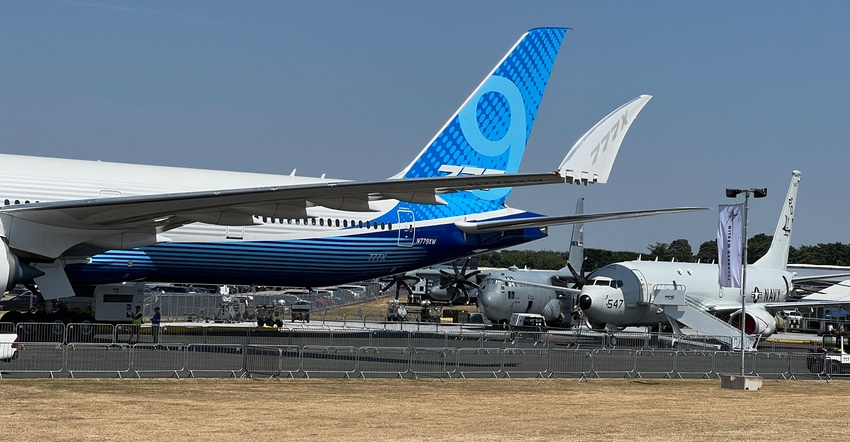July 27, 2022

Any reader of this column knows I like trade shows — farm shows, for sure — but I’ve been able to attend a few others such as the Consumer Electronics Show. This time out, I netted a unique opportunity, thanks to colleagues at our sibling group at Aviation Week and Space Technology.
I traveled to the Farnborough International Air Show in England to see the latest in aircraft technology and help with some video chores. Along the way, I found out that major industries like agriculture and aviation aren’t so far apart when it comes to some major concepts.
Sure, the particulars are a lot different between a $750,000 combine and a $70 million business jet, but both of those machines must be maintained, and in each industry, big data is becoming even more important.
During a session with Raytheon, a company that makes everything from engines such as Pratt & Whitney to avionics systems for aircraft, I found myself in comfortable territory. They were talking about managing data in new ways to provide a holistic solution from aircraft to airport.
In agriculture, we’re working on ways to manage data to be more holistic about how we run everything from the equipment to the accounting. And equipment makers are using similar concepts in both industries to manage equipment maintenance.
When Raytheon folks started talking about using data to manage aircraft maintenance, it brought to mind conversations I’ve had with major farm equipment makers about predictive maintenance systems. From jets to tractors, the same concepts apply.
And yes, I know one is a little more “mission critical” than the other. While a plane that’s down for unscheduled maintenance is an inconvenience for passengers, a tractor or combine that goes down can cost a farmer plenty.
Essentially, however, the principles are the same. Collect sensor data from a working machine and use it to predict failures or scheduled maintenance times to make a business more efficient. And big data in both industries is teaching equipment makers more about how their technology is deployed, and maintained, in the field.
And yes, sustainability
Ag sustainability is getting a lot of attention these days. It’s a hot topic at an air show too where companies are signing deals to buy new planes or invest in new more efficient technologies for the future.
From electric motors for air travel — which is still several years off — to using new fuel sources like hydrogen, some of the conversations sounded familiar. I’ve been in sessions with engine makers that serve agriculture looking into use of hydrogen as a fuel source to power bigger machines. Electric-powered machines are also part of the conversation.
One area in aviation that brings a major opportunity for agriculture is to provide material used in making sustainable aviation fuels. One U.S. company, Gevo, has already signed several supply agreements with airlines to provide fuels made from biomass in a proprietary process the company has developed. The familiar names that have signed on include Delta, Aer Lingus, Finnair and Japan Air Lines.
Discussion of sustainable aviation fuel came up a few times, and the Farnborough Airport subsidized the price of the fuel for the show and sold out. Price is still an issue. However, growth in this industry provides another market opportunity to use field crops to produce a drop-in fuel already in demand by the airline industry.
Any trade show is a chance to learn. Farnborough was fascinating. While my two-day visit were also the two hottest days in recorded history for the United Kingdom, it was still a good time. And who hasn’t spent a good hot day at a farm show?
You May Also Like




